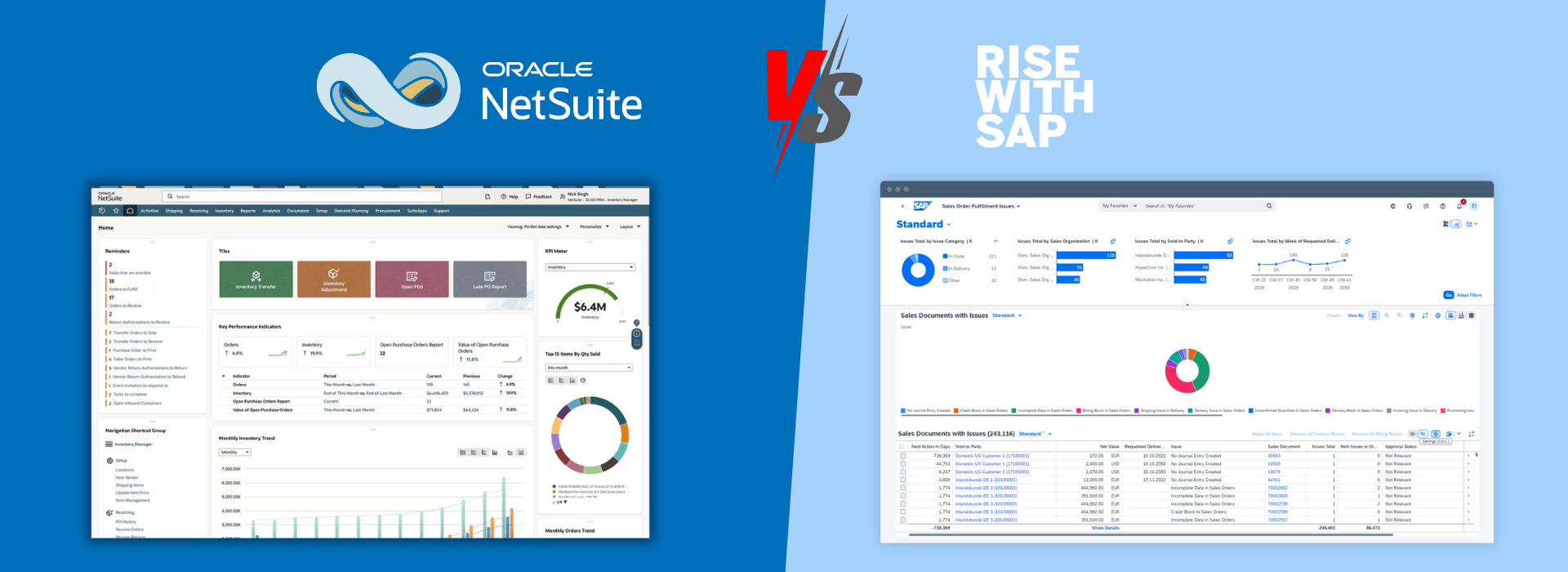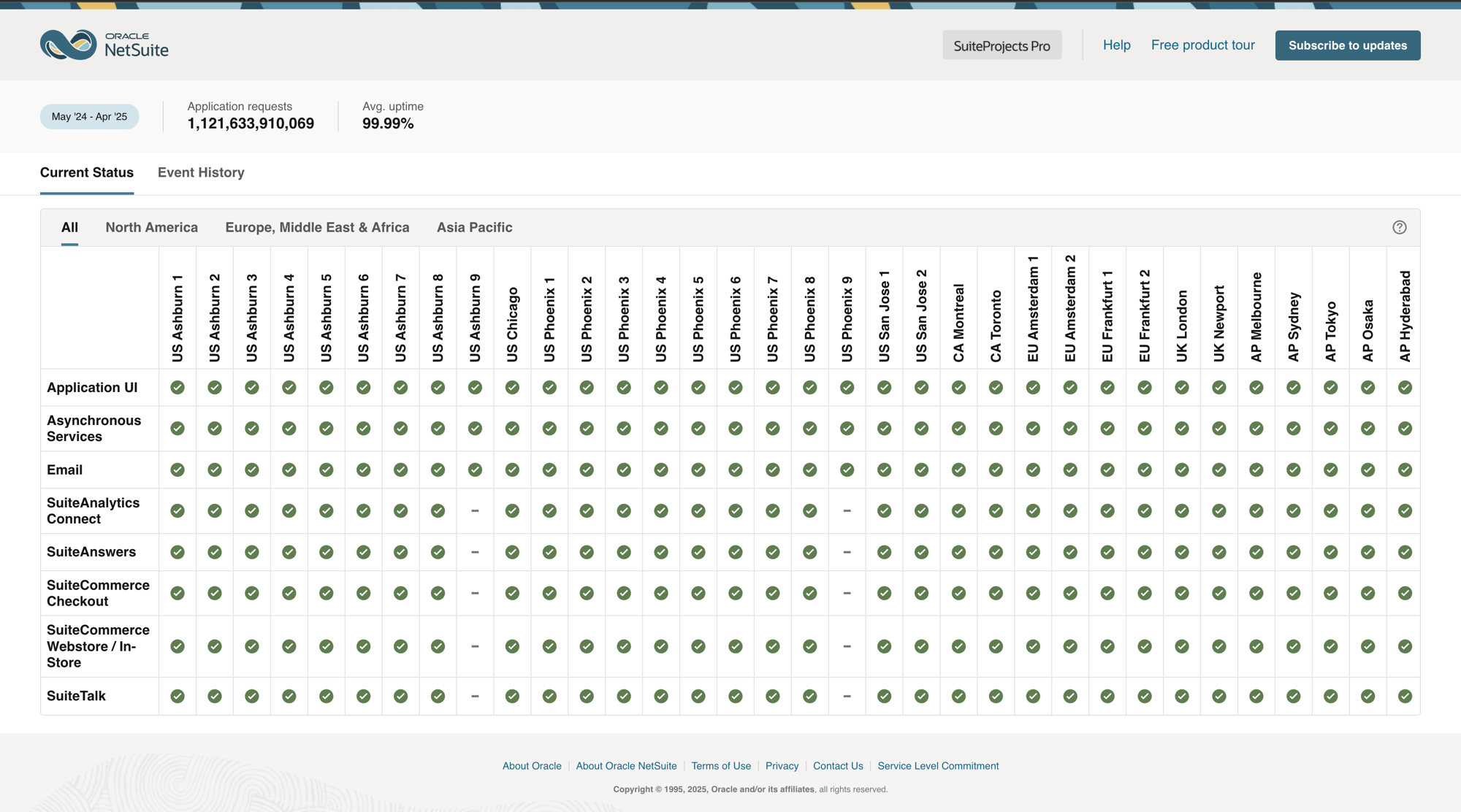NetSuite vs. RISE with SAP (S/4HANA Public and Private Cloud)
Which Cloud ERP is Right for Your Business?
Helping leaders choose the right platform to scale smarter and transform faster to win bigger.
Introduction
Choosing the right cloud ERP system is a strategic decision that can define the future of your business operations. Whether you are a high-growth mid-sized company or a global enterprise, your ERP platform needs to deliver scalability, flexibility, and speed. In this guide, we compare two leading cloud ERP options: Oracle NetSuite and RISE with SAP, which includes both SAP S/4HANA Public Cloud and SAP S/4HANA Private Cloud editions. We will help you understand which solution best fits your transformation goals, operational complexity, and timeline.

1. Deployment & Cloud Architecture
NetSuite is a true multi-tenant SaaS ERP that runs exclusively in the public cloud, with no servers or infrastructure to manage. Implementation is rapid, typically completed in 3–6 months using SuiteSuccess methodology.
RISE with SAP (S/4HANA Public and Private Cloud) offers deployment flexibility but is not a pure SaaS model. The public cloud edition is designed for standardization and faster innovation cycles, while the private cloud edition supports deeper customization and deferred upgrade schedules. Both editions are available under the RISE with SAP contract and can be deployed in public, private, or hybrid environments. Implementation timelines vary significantly—typically 6–12+ months for the public edition and 12–18+ months for the private edition—depending on the degree of customization and organizational complexity.
Key Insight: NetSuite is ideal for speed and simplicity. SAP is better suited for enterprises that require heavy customization and complex industry-specific modules.
2. Upgrade Cycle and Maintenance
NetSuite: Automatic biannual upgrades are included in the subscription. Customizations are built within the SuiteCloud platform, ensuring compatibility.
SAP Public Cloud: Also includes upgrades in the subscription, but indirect costs can arise from testing custom extensions and retraining users.
SAP Private Cloud: Clients can defer upgrades up to 5 years. Upgrade complexity and cost depend on the level of customization.
Key Insight: NetSuite offers a worry-free upgrade experience, while SAP requires more internal effort.
3. Customization & Platform Extensibility
NetSuite: Uses SuiteScript (JavaScript), SuiteFlow, and SuiteBuilder for low-code/no-code customization. Supports 500+ prebuilt SuiteApps.
SAP: Customization is handled through the SAP Business Technology Platform (BTP). The public cloud edition supports in-app and side-by-side extensibility with a focus on low-code/no-code for fit-to-standard scenarios. The private cloud edition allows broader extensibility, including modifications and custom code similar to traditional SAP ECC or S/4HANA on-premise setups. While this provides maximum flexibility, it requires significant IT expertise and governance to maintain upgrade compatibility.
Key Insight: NetSuite customization is agile and suited for lean IT teams; SAP is more robust but complex.
4. Infrastructure & Performance
NetSuite: Hosted on Oracle Cloud Infrastructure (OCI). Clients don’t choose data centers, which simplifies setup and management. NetSuite allows companies to start small with essential modules and expand as their business grows, while still benefiting from high availability and security built into the platform.
SAP: Offers flexible deployment in public or private cloud using data centers from AWS, Azure, GCP, or SAP itself. The RISE with SAP offering bundles infrastructure, ERP software, technical managed services, and business process intelligence tools under a unified contract.
Key Insight: NetSuite simplifies deployment. SAP offers more control for enterprises with hybrid infrastructure needs.
NetSuite Global System Status Dashboard
This dashboard reflects NetSuite’s commitment to transparency and enterprise-grade uptime. With over 1 trillion application requests processed and a 99.99% average uptime, NetSuite provides real-time visibility into the operational health of its global data centers—empowering customers with trust, reliability, and performance assurance.

5. Global Management & Compliance
NetSuite: Supports 190+ currencies, 100+ tax regimes, and 27 languages. Designed for mid-market global expansion with real-time consolidation.
SAP: Designed to support both public and private cloud scenarios. The public cloud offers built-in compliance frameworks for global operations, while the private cloud caters to more nuanced regulatory needs and internal control requirements. Both editions are strong in industries such as pharmaceuticals, manufacturing, energy, and financial services, where compliance and traceability are mission-critical.
Key Insight: NetSuite is streamlined for fast-growing global SMBs. SAP is a powerhouse for complex regulatory environments.
6. Business Transformation Focus
NetSuite: Fast ROI through prebuilt industry templates and SuiteSuccess. NetSuite allows businesses to start small with core functionality and gradually scale by activating additional modules as needed. It focuses on financial automation and operational efficiency, making it ideal for growing companies with evolving needs.
SAP: Offers business process intelligence through SAP Signavio and supports transformation journeys from legacy systems like SAP ECC. The public edition emphasizes fit-to-standard adoption, while the private edition enables deeper customization and process redesign tailored to enterprise-specific needs.
Key Insight: NetSuite drives lean transformation. SAP drives enterprise-wide reengineering.
Conclusion: Which ERP is Right for You?
-
Choose NetSuite if you prioritize faster implementation, lower IT overhead, and a flexible platform that scales easily with mid-market or fast-growing business models. It’s ideal for organizations seeking rapid ROI and cloud-native operations with minimal customization needs. NetSuite typically fits companies with annual revenues ranging from USD 5 million to USD 200 million, though larger enterprises with less complex needs also benefit from its agile capabilities.
-
Choose SAP S/4HANA Public or Private Cloud if you’re a large enterprise managing highly complex processes, requiring deep industry-specific functionality, and planning for a long-term IT roadmap with structured governance. The public edition is best for businesses adopting standard best practices quickly, while the private edition is ideal for those needing deep customization and longer-term upgrade flexibility. SAP typically fits enterprises with annual revenues exceeding USD 200 million, including multinational corporations and heavily regulated industries like manufacturing, utilities, or pharmaceuticals.
Both platforms are leaders in their category. The right choice depends on your business complexity, internal resources, and timeline for transformation.
As an Oracle NetSuite partner, Logiframe is here to help you evaluate whether NetSuite is the right fit for your business. Book a free consultation with our experts to explore how NetSuite can support your growth, efficiency, and digital transformation goals.
Free Guide:
Oracle NetSuite VS. RISE with SAP: Strategic Cloud ERP Comparison
Disclaimer:
This document is intended for informational and comparative purposes only. It reflects the general product positioning and capabilities of Oracle NetSuite and RISE with SAP as of April 2025, based on publicly available information from vendor websites, product documentation, and trusted industry sources.
ERP features, licensing models, and service offerings are subject to change without notice. Readers are strongly encouraged to consult directly with Oracle, SAP, or their authorized implementation partners to validate current capabilities and pricing for their specific business needs.
Logiframe makes no representations or warranties regarding the accuracy, completeness, or timeliness of the information contained in this document and assumes no liability for decisions made based on its content.

.png?width=141&height=85&name=logiframe-png%20(2).png)





-1.webp?width=287&height=191&name=Xero%20Recognized%20Among%20the%20Worlds%20Top%20250%20Fintech%20Companies%20in%202024%20(feature%20blog)-1.webp)
.webp?width=409&height=289&name=Untitled%20design%20(11).webp)
